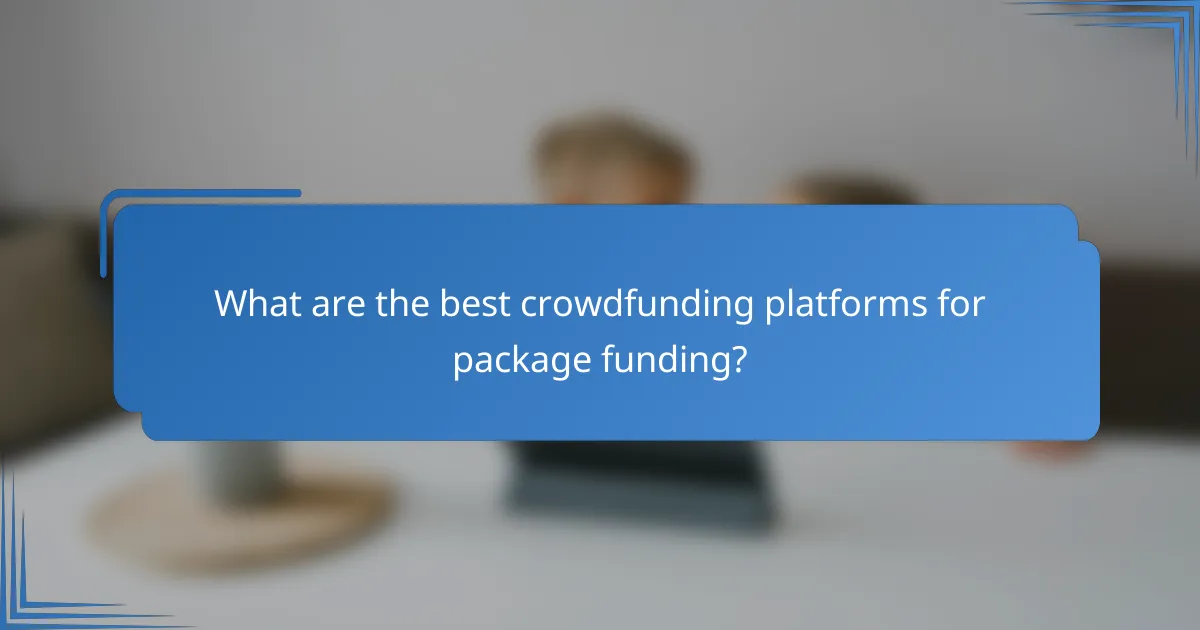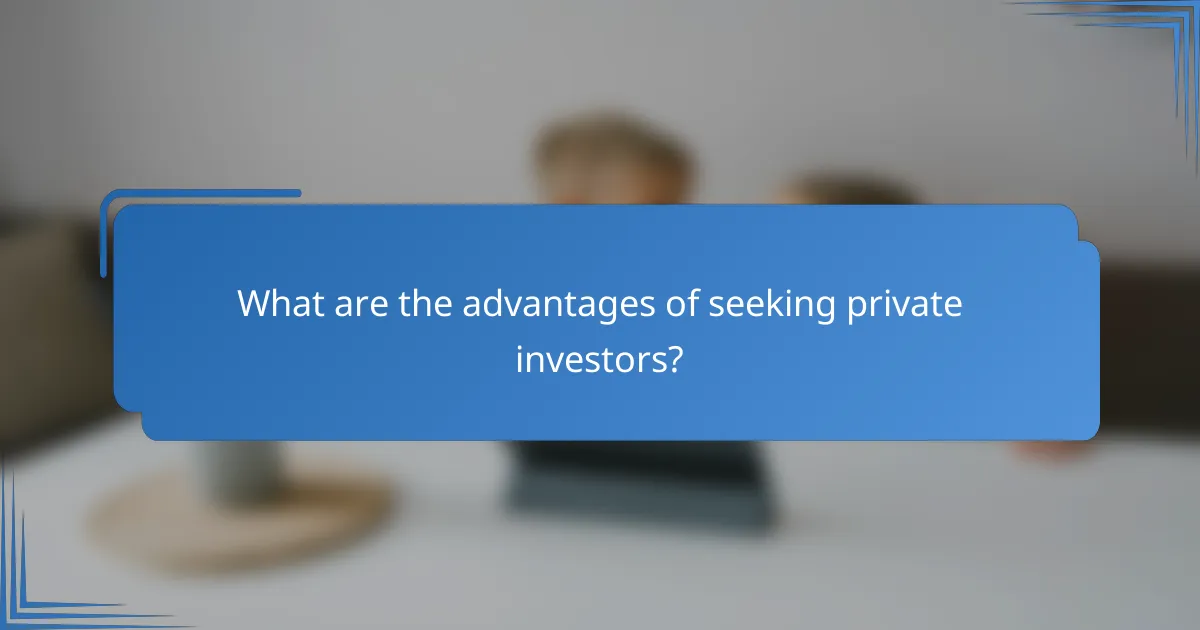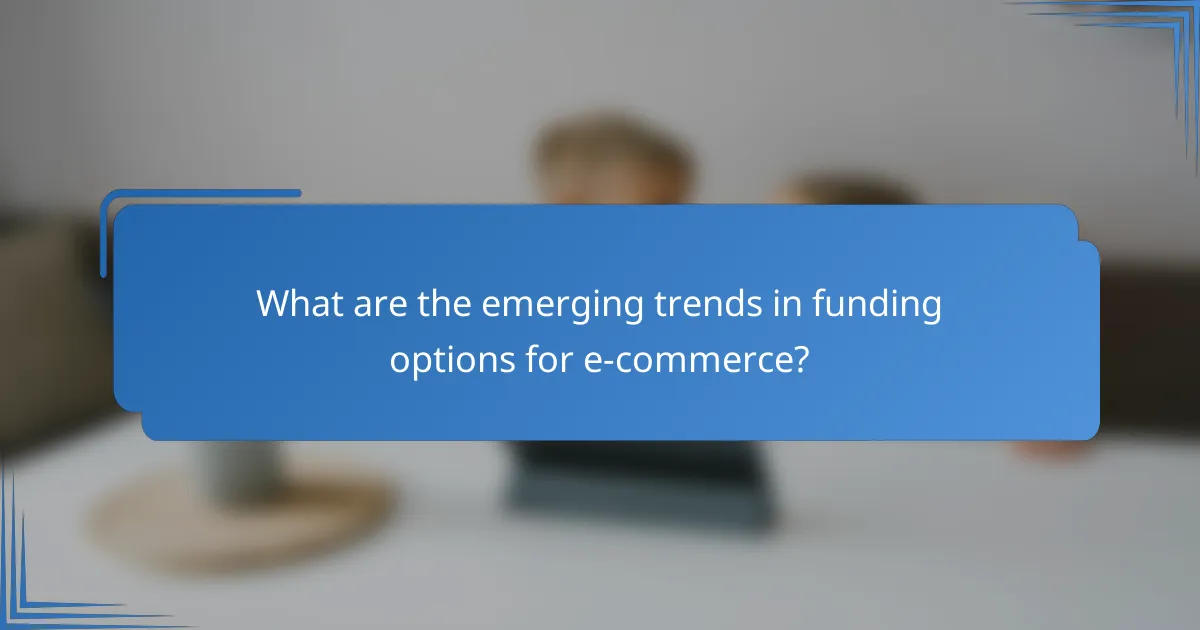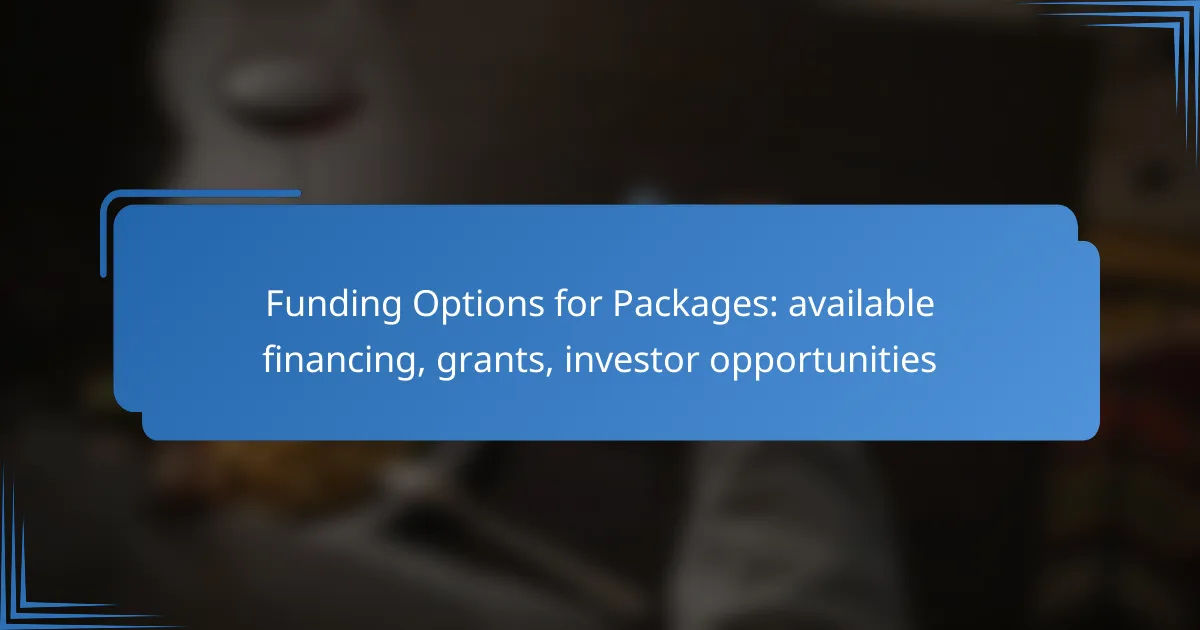In Australia, businesses seeking funding for packages can explore a variety of options, including government grants, private investors, crowdfunding, and bank loans. Each avenue presents distinct advantages and requirements that can facilitate access to essential capital for growth and innovation.

What funding options are available for packages in Australia?
In Australia, various funding options exist for packages, including government grants, private investors, crowdfunding, and bank loans. Each option has unique benefits and considerations that can help businesses secure the necessary capital for growth and development.
Government grants for small businesses
Government grants for small businesses in Australia provide financial assistance that does not require repayment. These grants often target specific sectors or projects, such as innovation, sustainability, or regional development.
To access these grants, businesses should research eligibility criteria and application processes through platforms like the Australian Government’s Business website. Typical grants can range from a few thousand to several hundred thousand Australian dollars, depending on the program.
Private investor opportunities
Private investors, including angel investors and venture capitalists, offer funding in exchange for equity in the business. This option can provide not only capital but also valuable mentorship and networking opportunities.
When seeking private investment, businesses should prepare a solid business plan and pitch. It’s essential to understand the implications of giving away equity and to choose investors whose vision aligns with the company’s goals.
Crowdfunding platforms
Crowdfunding platforms allow businesses to raise small amounts of money from a large number of people, typically via online platforms. This method can be effective for generating interest and validating a product before launch.
Popular crowdfunding platforms in Australia include Kickstarter and Indiegogo. Businesses should create compelling campaigns that clearly outline their goals and offer attractive rewards to backers to maximize funding potential.
Bank loans for e-commerce
Bank loans for e-commerce businesses provide a traditional financing option, allowing companies to borrow funds for various needs, such as inventory or marketing. These loans typically require a solid credit history and a detailed business plan.
Interest rates and repayment terms can vary widely, so it’s crucial to compare offers from different banks. Businesses should also consider the potential impact on cash flow and ensure they can meet repayment obligations without jeopardizing operations.

How can I apply for government grants in Australia?
To apply for government grants in Australia, you must identify suitable programs that align with your project and meet the specific requirements set by the funding body. The application process typically involves submitting detailed proposals that outline your project’s objectives, budget, and expected outcomes.
Eligibility criteria for grants
Eligibility for government grants in Australia varies by program but generally includes factors such as the type of organization (e.g., non-profit, business, or educational institution), project scope, and alignment with government priorities. Some grants may require co-funding or specific qualifications, so it’s essential to review the guidelines carefully.
For example, small businesses might be eligible for grants aimed at innovation, while community organizations could qualify for funding focused on social projects. Always check the specific criteria for each grant to ensure you meet the necessary conditions.
Application process overview
The application process for government grants typically involves several key steps. First, you should research available grants and select those that fit your project. Next, prepare your application, which usually includes a project description, budget, and supporting documents.
After submission, applications are often reviewed by a panel, and successful candidates may be invited for interviews or to provide additional information. It’s advisable to start early and allow ample time for revisions, as the competition can be intense, and applications may require detailed explanations and justifications.

What are the best crowdfunding platforms for package funding?
The best crowdfunding platforms for package funding include Kickstarter and Indiegogo, each offering unique features suited for different types of projects. These platforms enable creators to raise capital by pre-selling products or collecting donations from backers interested in their ideas.
Kickstarter for product launches
Kickstarter is ideal for launching new products, particularly in creative industries like technology, design, and art. It operates on an all-or-nothing funding model, meaning projects must reach their funding goal to receive any money pledged. This approach encourages backers to support projects they believe will succeed.
To maximize success on Kickstarter, create a compelling campaign page with engaging visuals and a clear description of your product. Set a realistic funding goal and timeline, and consider offering attractive rewards for different pledge levels to incentivize backers.
Indiegogo for flexible funding
Indiegogo offers more flexible funding options compared to Kickstarter, allowing creators to choose between fixed or flexible funding models. With flexible funding, you can keep the funds raised even if you don’t meet your goal, making it suitable for projects that may require less certainty in funding outcomes.
This platform is great for a wide range of projects, from tech gadgets to social causes. When using Indiegogo, ensure your campaign is well-promoted through social media and email outreach to attract backers. Offering early-bird discounts or exclusive perks can also help drive contributions.

What are the advantages of seeking private investors?
Seeking private investors can provide significant benefits, including access to capital and valuable resources. Investors often bring not only funding but also expertise and connections that can help a business grow.
Access to mentorship and networks
Private investors frequently offer mentorship and access to their professional networks, which can be invaluable for startups and growing businesses. This guidance can help entrepreneurs navigate challenges and make informed decisions.
Building relationships with experienced investors can open doors to new opportunities, partnerships, and potential customers. Engaging with these networks can lead to introductions that might not be available through traditional channels.
Potential for larger funding amounts
Private investors often have the capacity to provide larger sums of money compared to traditional financing options like bank loans or grants. This can be particularly beneficial for businesses looking to scale quickly or invest in significant projects.
While the amounts can vary widely, many private investors are willing to commit hundreds of thousands to millions of dollars, depending on the business model and growth potential. However, it’s essential to clearly communicate your business plan and expected returns to attract substantial investments.

How do bank loans compare to other funding options?
Bank loans typically offer structured financing with fixed repayment terms, making them a reliable option for funding packages. However, they may not be as accessible as alternative funding sources like grants or investor financing, which can provide more flexible terms or no repayment obligations.
Interest rates and terms
Bank loans generally have interest rates that can vary significantly based on creditworthiness, ranging from low single digits to high teens. Terms usually span from a few years to over a decade, depending on the loan amount and purpose.
In contrast, grants often do not require repayment and may have specific conditions for use, while investor financing can involve equity stakes, which may lead to higher long-term costs if the business grows significantly.
Approval process duration
The approval process for bank loans can take several weeks to months, as lenders require extensive documentation and credit checks. This timeline can be a disadvantage for businesses needing quick access to funds.
On the other hand, grants may take longer due to application reviews and funding cycles, while investor financing can sometimes be secured more rapidly, depending on the investor’s readiness and the business’s appeal. Businesses should weigh these timelines against their funding needs to choose the best option.

What criteria should I consider when selecting a funding option?
When selecting a funding option, consider the amount of funding needed, the timeframe for receiving funds, and how the choice will impact ownership of your business. Each criterion can significantly affect your financial strategy and long-term goals.
Amount of funding needed
Determine how much capital you require to achieve your business objectives. This could range from a few thousand dollars for small projects to millions for larger ventures. Be specific about your needs to avoid underfunding or overextending your financial commitments.
Consider breaking down your funding needs into categories such as operational costs, marketing expenses, and product development. This clarity will help you choose the most suitable funding source, whether it be loans, grants, or investments.
Timeframe for funding
The timeframe for securing funding can vary widely depending on the source. Grants may take several months to process, while loans can be secured in weeks. If you need immediate capital, consider options like personal loans or crowdfunding, which can provide faster access to funds.
Assess your project’s timeline and align it with the funding process. If you are launching a product, ensure that the funding arrives before critical milestones to avoid delays in execution.
Impact on ownership
Different funding options can affect your ownership stake in the business. For instance, equity financing from investors may dilute your ownership, while loans do not impact equity but require repayment with interest. Understand how each option aligns with your long-term vision for ownership and control.
Evaluate the trade-offs between maintaining full ownership and the potential benefits of bringing in investors who can provide not just capital but also expertise and connections. Make informed decisions based on how much control you are willing to share in exchange for funding support.

What are the emerging trends in funding options for e-commerce?
Emerging trends in funding options for e-commerce include increased reliance on alternative financing methods, such as crowdfunding and peer-to-peer lending, as well as growing interest from venture capitalists and angel investors. These trends reflect a shift towards more accessible and diverse funding sources for online businesses.
Available Financing
Available financing for e-commerce businesses has expanded significantly, with options ranging from traditional bank loans to modern fintech solutions. Many online retailers now consider options like merchant cash advances, which provide quick capital based on future sales, or invoice financing, allowing businesses to access funds tied up in unpaid invoices.
When seeking financing, e-commerce entrepreneurs should evaluate their cash flow needs and repayment capabilities. Comparing interest rates, fees, and terms across different lenders can help identify the most suitable option. It’s also wise to consider the impact of financing on overall business operations and growth potential.
Grants
Grants are a valuable funding option for e-commerce businesses, particularly those focused on innovation or social impact. Various government and private organizations offer grants to support small businesses, often with specific eligibility criteria and application processes.
To secure a grant, entrepreneurs should research available opportunities and prepare a compelling proposal that clearly outlines their business model, goals, and potential impact. Keeping track of deadlines and required documentation is crucial for a successful application. Additionally, local chambers of commerce or business development centers can provide guidance on available grants.
Investor Opportunities
Investor opportunities for e-commerce ventures are increasingly diverse, with angel investors and venture capitalists actively seeking promising startups. These investors often provide not only capital but also valuable mentorship and networking opportunities, which can be crucial for growth.
When approaching potential investors, e-commerce businesses should have a solid business plan and a clear value proposition. Demonstrating traction, such as sales growth or customer engagement metrics, can make a compelling case for investment. Entrepreneurs should also be prepared to discuss how they plan to use the funds and the expected return on investment for the investors.
